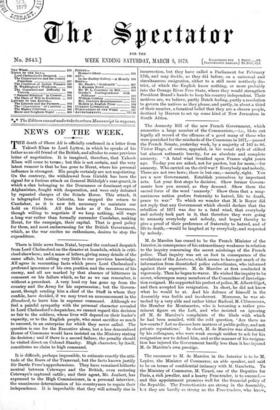The Amnesty Bill of the new French Government, which amnesties
a large number of the Communists,—i.e., blots out legally all record of the offences of a good many of those who were punished for the misdeeds of the Commune in 1871,—passed the French Senate, yesterday week, by a majority of 163 to 86. Victor Hugo, of course, appealed, in his usual style of stilted but almost asthmatic brevity, for an absolute and complete amnesty. "A fatal wind breathed upon France eight years ago. To-day you are asked, not for pardon, but for more,—for amnesty. Who carried on the civil war? Everybody and nobody. There are not two laws ; there is but one,—namely, right. You are a new Government. Establish yourselves by important acts. Let your first steps be decisive. Show former Govern- ments how you ascend, as they descend. Show them the sacred force of the word amnesty.' Show them that a mag- nanimous nation prefers fraternity to hatred, life to death, peace to war." To which we wonder that M. le Royer did not reply that any Government which should declare that the rebellion of 1871 was due to a fatal wind, that everybody and nobody took part in it that therefore they were going to amnesty everybody and nobody, and hoped thereby to give a proof of their preference of fraternity to hatred, and of life to death,—would be laughed at by everybody, and respected by nobody.


































